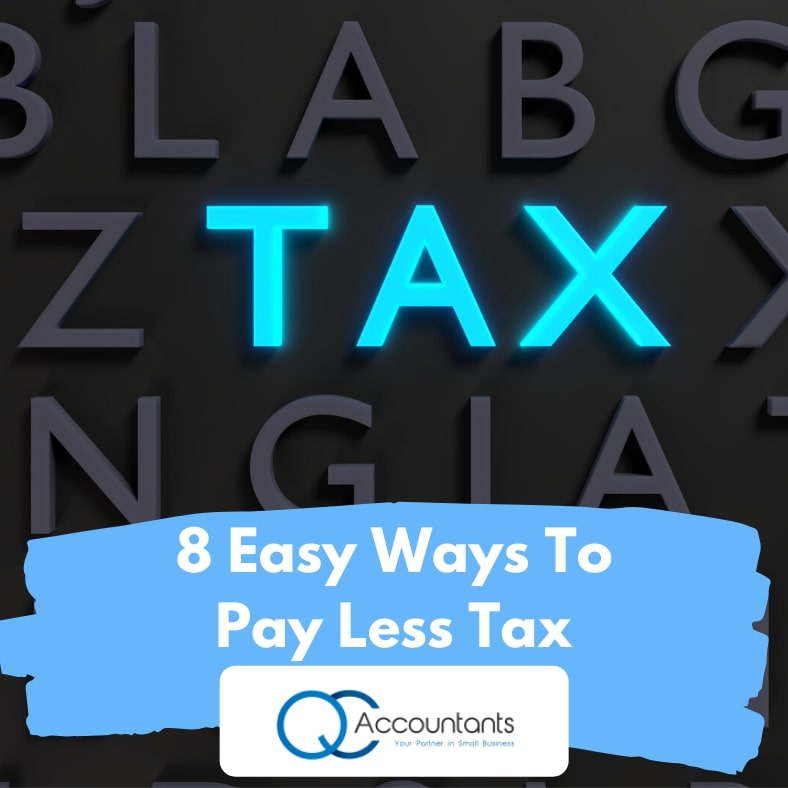Minimising your tax requirements is a well known method for improving a business’ financial health. However, not all business owners know how to make the most of thresholds, deductions and smart money management. You could be paying much higher tax than you should be. By the end of this article, you will have a better understanding of how to save on your tax bills this year. Our 8 tips for paying less tax are as follows:
- Keep Good Tax Records
- Know your deductions
- Charitable donations
- Medicare Levy Surcharge vs Private Health Cover
- Manage the timing of your tax deductible expenses
- Smart management – sell an asset that is subject to Capital Gains Tax (CGT)
- Pay off your mortgage
- Advice from a Tax Agent
1. Keep GOOD tax records.
By law, you are required to keep written documentation of all business financial activities to ensure you meet your obligations as a business. However, many businesses can find themselves missing out on big deductions from their tax due to poor record keeping. Having receipts to present to the ATO at tax time is crucial to making the most of every deduction you are eligible for. Maintain an organised system of records for all of your income and expenses, and check regularly for discrepancies and issues to prevent having a build up of things to resolve when tax times rolls around. It pays to be prepared.
2. Know your deductions
Tax deductions are invaluable when it comes to reducing the taxes you pay. Most expenses that are related to income generation are tax deductible. This can include operating expenses such as stationery supplies, or even wages.
Your business may also be entitled to concessions, offsets and/or rebates depending on the size and activity of your business. Some business tax concessions include:
- Small business concessions which allow for flexible payment and reporting options
- Primary producer concessions affecting how much income you include in your reporting for the year
- Special professionals, sportspersons and entertainers concessions which can qualify you for income averaging
Businesses may also be eligible to claim tax offsets if they meet certain criteria:
- Small businesses
- Businesses who paid tax on income in foreign countries
- Organisations who underwent eligible, registered research and development (R&D) activities may be entitled to the Research and Development Tax Incentive (R&D Tax Incentive or R&DTI)
- Businesses who reported tax losses in the 2019–20, 2020–21 or 2021–22 income years.
3. Charitable donations
Making donations to charitable organisations not only feels good, it can also help you save on your taxes. In Australia, charitable donations are tax deductible and may be applied to reduce the amount of tax you are required to pay.
Money, property, shares and in some cases Heritage and Cultural gifts are all charitable donations which can be deducted from your taxes. The amount or value of the donation/s is deducted from your taxable income, meaning you will receive a percentage of the donation back at tax time. Donations must have been made to Deductible Gift Recipients (DGRs), registered with the ATO. You must also provide a tax invoice from the DGR in order to claim the deduction. There is no limit or threshold for charitable donations.
4. Medicare vs private health care
If you are earning more than $90K annually as an individual, or more than $180K for families, you are required to pay a minimum of 1% more of your income to the Medicare Levy Surcharge, in addition to the mandatory 2% surcharge already paid by most taxpayers, a total of 3% of your annual gross income.
Comparatively, basic private health cover and insurance can come in at less than 1% of your annual income. This means you pay less annually for private health cover than you are required to pay in Medicare Levy Surcharges, and reduce the taxes you have to pay at the same time.
5. Timing your expenses
If you know ahead of time of expenses that will attract a high tax deduction, you can use the timing of your purchase to help improve your tax situation. You should aim to make more expensive tax deductible purchases in the financial year where you have made the most income, as this will maximise the amount of tax you can claim back with deductions.
In financial years where you have generated less taxable income, you will have a lower deductible income, and so making high value deductible purchases will not result in as much return.
6. Timing your Capital Gains Tax (CGT)
If you have owned an asset for longer than twelve months you may be entitled to a 50% Capital Gains discount. If you haven’t owned the asset for at least twelve months, you will have to pay more CGT.
Does your income fluctuate? If so, you may choose to sell the asset in a year you expect to earn a lower income, as your capital gain won’t have such an impact on your tax liability.
Being strategic about when you sell assets which incur CGT can also help you reduce the annual cost of your taxes. Selling an asset after owning it for longer than 12 months can entitle you to a 50% discount on your Capital Gains, which can mean massive savings. Additionally, it can be beneficial to sell assets in financial years where you expect a lower income. Doing this means the capital gain will be paid in a lower income bracket and threshold, effectively lowering the amount you will be required to pay in CGT.
It is important to speak with professional financial advisors, like our team at QCA, before making decisions in regards to CGT. This will ensure you have a thorough understanding of your legal obligations, and to minimise the tax incurred from your capital gains.
7. Pay off your mortgage
Considering the amount of tax you pay on financial savings each year, there are much better places to put your assets to ensure you hold on to as much of your annual income as possible. Investing your savings into unpaid mortgages not only reduces your loan debt, but keeps your hard earned money safe from incurring savings taxes.
8. Get advice from an expert
Taxes can be complex, and there are so many different ways to increase and decrease your taxes that it can quickly become overwhelming if you can’t dedicate time to understanding it all. Tax professionals like the team at QCA are essential to help you minimise the tax you are required to pay, and make the most of government tax programs.
Conclusion
There are many ways to pay less tax as a business. Some of our recommended methods include keeping good records, knowing your deductions, timing your expenses and asset sales strategically, and getting quality advice and financial management from a qualified professional provider like QCA. Additionally, some proactive financial moves you can make include making charitable donations, considering private health care, and putting savings into mortgage repayments.
If you have more questions about how to reduce your tax liability, or if you’re ready to start working with a professional team, get in touch with QCA today!








